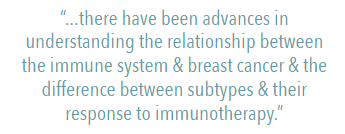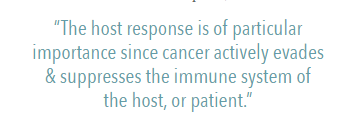 Peter P. Lee, M.D., the Billy and Audrey L. Wilder Professor in Cancer Immunotherapeutics at City of Hope, has for two decades been interested in treating cancer by stimulating or enhancing a person’s own immune system. This approach, called immunotherapy, has gained much attention in recent years and Lee is a leader in the field. His outlook for 2017 is full of promise for a more personalized approach to breast cancer treatment.
Peter P. Lee, M.D., the Billy and Audrey L. Wilder Professor in Cancer Immunotherapeutics at City of Hope, has for two decades been interested in treating cancer by stimulating or enhancing a person’s own immune system. This approach, called immunotherapy, has gained much attention in recent years and Lee is a leader in the field. His outlook for 2017 is full of promise for a more personalized approach to breast cancer treatment.
“It’s very exciting that we’ve seen a dramatic response for immunology in patients with cancers like melanoma, lymphoma, bladder cancer and others,” said Lee, who is chair of the Department of Immuno-Oncology, co-leader of the Cancer Immunotherapeutics Program and a professor in the Department of Hematology & Hematopoietic Cell Transplantation. “But breast cancer has lagged behind a bit and so we’re trying to understand why it’s different and how to make immunotherapy more effective for breast cancer patients.”
Fortunately, he said, there have been advances in understanding the relationship between the immune system and breast cancer and the difference between subtypes and their response to immunotherapy.
For example, new data has shown that tumors that are infiltrated by T cells — a type of white blood cell that plays an important role in immunity — translate to better outcomes in response to immunotherapy. However, this effect is seen more so among patients with the subtypes of triple negative and Her2 type breast cancers than in the more common types of breast cancer that fall under the luminal subtypes.

“We have some new insight on why this may be and are working to develop approaches based on those theories that will lead to better immunotherapy options for all types of breast cancer,” said Lee.
Medicine Gets Personal
Lee says another key issue is figuring out how to select the right patient for a particular immunotherapy based on indicators like biomarkers and the tumor microenvironment. “You can tie this in with the notion of precision medicine, which City of Hope is also very interested in,” he said.
In fact, City of Hope and the Translational Genomics Research Institute (TGen) recently joined forces to advance precision, or personalized, medicine and accelerate the speed with which scientists and medical staff convert research discoveries into cures for patients.
“Everyone talks about sequencing cancer cells when they talk about precision medicine, but immunotherapy looks outside the cancer cell at the host response,” said Lee. “So I’m looking for that mirror image, to try and expand the vision of precision medicine and look at the host response, too.”

The host response is of particular importance since cancer actively evades and suppresses the immune system of the host, or patient. So if researchers can understand the mechanisms by which cancer suppresses immune function, they can then develop strategies to enhance immune function and ultimately make it successful in controlling the cancer. This is the aim of many new drugs and clinical trials at City of Hope, said Lee.
“The key is finding the right combination of therapies,” he said. “No one thing will work for everyone, so my goal is to intelligently devise synergistic combinations for a wide range of patients with different subtypes of breast cancer.”

 Login
Login

